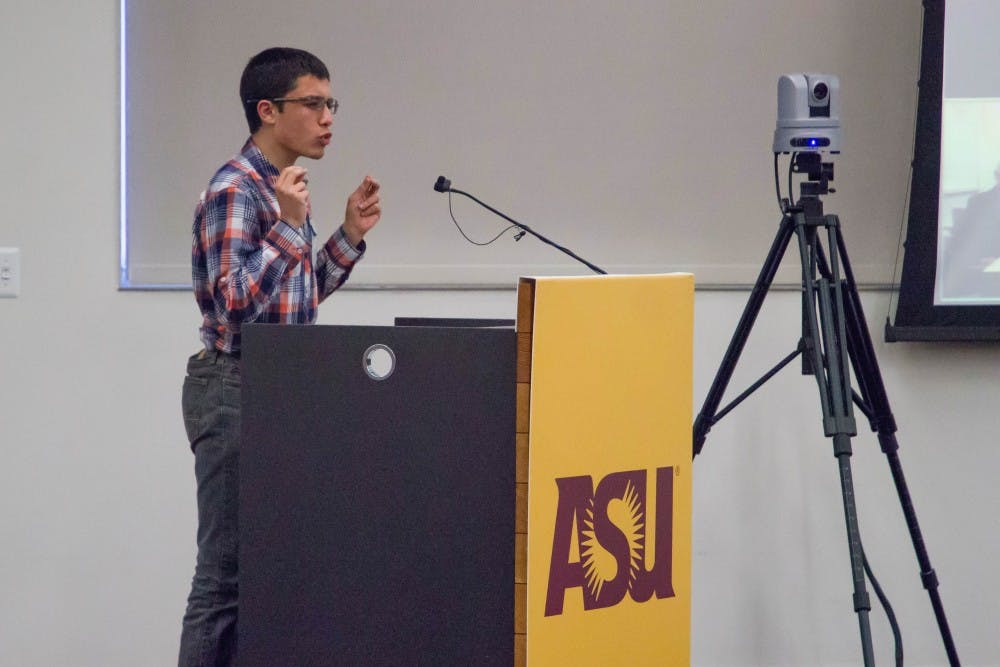ASU students gave mixed reviews to tuition and fees proposals for the 2018 — 2019 academic year at tuition hearings hosted by The Arizona Board of Regents at the Memorial Union Tuesday afternoon.
Comments were heard at a first-come, first-served basis at sites located throughout the state, several of which were hosted at each of ASU’s major campuses.
Following this event, the university presidents will present their proposals at a tuition workshop on March 29 at the ASU Memorial Union Turquoise Room. ABOR will then set final tuition and fees for the 2018-2019 academic year on April 5 and 6 meetings at UA.
ASU President Michael Crow said the University has designed its tuition proposals to facilitate its objectives of excellence, accessibility and impact.
“We have had a number of financial issues in the last several years including deep cuts by the state of Arizona to the funding of the core operating budget of the University,” he said at the ABOR hearings today. “In particular, these have been quite challenging to overcome, but we nonetheless have overcome them and have produced a new model that we have been advancing for the last several years.”
Crow said tuition is not a meaningless thing but rather an investment made by students and their families.
“The return on the investment of individuals attending this University is dramatic in terms of their life outcomes, and it’s also dramatic in terms of their family’s financial outcomes,” he said. “We have worked very hard to deliver a fantastic value proposition and our tuition proposals reflect that.”
The ASU tuition proposal called for no increase for undergraduate resident students and incremental hikes for other students.
Undergraduate Student Government Tempe held a special session meeting to discuss President Crow’s tuition proposal on March 23.
The government operations committee for USGT wrote a bill that discusses USGT’s opinion on the proposed tuition increase.
The debate went into the night as senators proposed amendments, examined poll data and current tuition rates. The text of the bill of that eventually passed read: “The majority of Undergraduate Student Government Tempe reluctantly opposes the tuition proposal for the 2018-19 school year.”
"Why would we want to raise anyone's tuition," said sophomore Lydia Chew, a college of liberal arts and sciences senator at the USGT meeting.
Senators in opposition to the tuition hikes felt that tuition should be kept flat across the board, not just for resident undergraduates, and that the University should be more transparent with how tuition is spent.
Maxim Quint, a freshman studying math and a USGT senator on the government operations committee, said at the hearing today that the value of an Arizona college degree, whether it be at NAU, ASU or UA, balances a reputable quality with an affordable cost, but he worries that if its cost is raised so high, it will not be worth the diplomas students have.
"I’m not in favor or against today’s tuition proposals," he said. "What I worry about is where we are going to spend the money. How are we going to be responsible with what we’re being given? The question is: are we going to check ourselves before we wreck ourselves?”
USGT President Brittany Benedict, a marketing senior, spoke in support of the proposal at the hearing on March 27.
"As students, we value quality education while simultaneously valuing equity," she said. "At (the ASASU Council of Presidents), we value the strategic approach our University is taking to provide a comprehensive college education as well as collegiate experience."
Grant Falvo, a school of sustainability junior, came to the special session to strongly oppose the tuition increase and said this increase will “burden students in more ways than one."
“It forces students to pursue degrees that will allow them to pay off this debt, which encourages them pass classes instead of learning and facilitating the education of others,” Falvo said. “It creates classrooms of empty chairs, silent faces and fewer inspiring individuals that truly engage in their education.”
Reach the reporters at Kimberly.Rapanut@asu and cmgiulia@asu.edu and follow @kimrapanut and @tinamaria_4 on Twitter.
Like State Press on Facebook and follow @statepress on Twitter.




